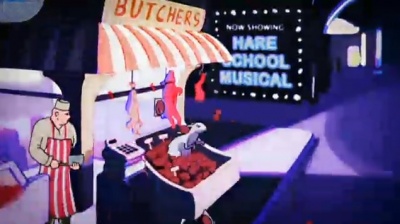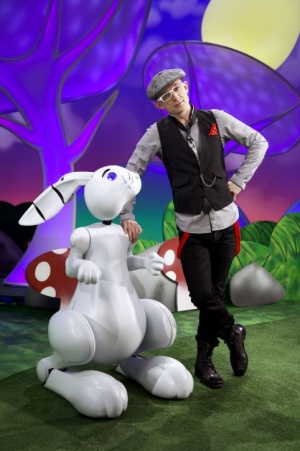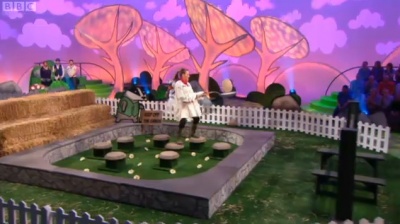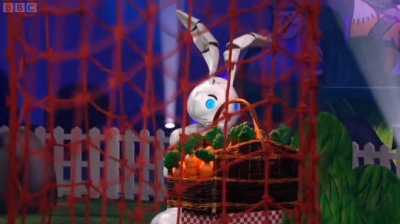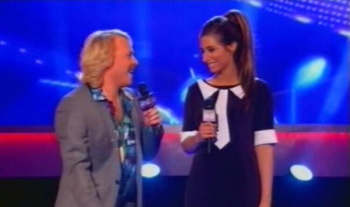Weaver's Week 2011-05-29
Last week | Weaver's Week Index | Next week
Congratulations to the Celebrity Juice team, who probably should be celebrating this week. Their episode on 12 May broke through the 2 million viewer mark, a phenomenal score for a digital-only channel. This week's Week reviews two shows that still go out on squeaky old analogue: one of them attracts about twice as many viewers, the other about half as many.
Contents |
Don't Scare the Hare
BBC1, Saturdays 23 April – 28 May
This review is mostly based on the show of 30 April.
Readers may be aware that the BBC is moving a number of departments up to its new development in Salford. Education and learning, that's moving up from London. Religion and Ethics is moving across from the other side of Manchester, and if they can lose The Moral Maze, we'd be grateful. Children's programming, that's going to be coming from the north. So is Radio 5, so is BBC Breakfast, and so are all the Sports programmes. Even some of the rusty old hulks abandoned in the car park are heading north.
The departments are moving this year, and many people are in the process of packing their life's work up into wooden crates made from the plot of Eldorado, making sure they're securely tied with string and sealed with BBC coffee, before loading them into vans and hoping to see them again at the other end.
Unfortunately, the BBC is a bit strapped for cash at the moment, and has had to put the job of moving all these people out to tender. The winning removal people, Fay All and Van Ijsh, were by far the cheapest. But it's turned out to be a false economy, as an awful lot of the trunks have been delivered to the wrong department, or completely lost in transit. Still, there's a nation to be entertained, and the BBC can always rise to the occasion and make the best out of a bad job.
So, Don't Scare the Hare begins with a piece of animation, in which a cartoon coney goes from a hole in the ground to ... a hole in the ground, via some cringeworthy puns. Seriously, these are bad jokes, so poor that the Eurovision hosts turned them down as a bit rubbish. Not that this has anything to do with the rest of the show at all.
Instead, we get the first results of the dubious movers: the golf buggy that Cliff Evans likes to use while doing his golf coverage. Here, it's being driven by a bloke through what we presume will be the site of the Blue Peter garden once they've finished with it next month. The trees and pictures of animals are there, but the grass is artificial. It's a tremendously large arena, big enough to hold the entire Chalk Farm Salvation Army Band, yet this programme doesn't use more than a fraction of it.
According to the television critics' handbook, the full name of the bloke behind the wheel is "Jason Bradbury From Channel 5's The Gadget Show", but that's far too long a name, so we'll just follow the programme's lead and call him Jason.
He introduces two teams of three people: in the sample episode we saw, three young gentlemen and three young ladies. That's "young" in the sense of "they'd probably fit into the 25-and-unders category on The X Factor, but don't hold us to that". Name badges are handed out, one team in blue, one team in red. Obviously, then, Jason is going to follow Blast Lab's lead and call them "The Blues" and "The Reds". Right? Er, wrong, he's going to give them names that might raise a slight snigger. But just the one. And only if the audience is laughing already.
After about five minutes, we're finally ready to play game one. It's introduced by that top orchestral conductor Sue Perkins, in her trademark voiceover: pithy, covering all the facts, and leaving the listener in no doubt about the quality of the entertainment that's about to be played. Miss Perkins was a very late substitution, we understood that her role was originally to be played by Miranda Hart, who has a much slower and languid vocal delivery. In the sample episode, the challenge was to retrieve three large eggs and transport them on a giant spoon over an absurdly-long obstacle course, before putting the eggs into oversized eggcups, and all before a hugemungous toaster popped up. If an egg happened to hit the floor, it would scare The Hare.
The what? The Hare. With Mr. From Channel 5's The Gadget Show on the golf buggy was a robot hare. It's permanently perched on its hind legs, and is capable of running the whole gamut of emotions, from surprised to shocked, from slightly fearful to mildly alert, from running around like a small white dalek to trundling around like an oversized and less intelligent K9. That'll be from the children's department trunk: a semi-robotic character rejected by Dr Who for being too ludicrous. The central conceit of the show is that failure – in this case, letting the eggs fall from the spoon – is punished by The Hare a) being scared and 2) running away. Except that, as it lacks independently-articulated legs, it trundles away, which doesn't look anything like as good.
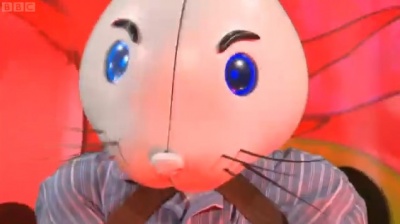 The hare, looking entirely calm. Or is it scared? The expressionless face would make The Hare brilliant at poker.
The hare, looking entirely calm. Or is it scared? The expressionless face would make The Hare brilliant at poker.We can compare The Hare with that other great animatronic mascot from history, Dusty Bin from 3-2-1. The whole idea of a dustbin with a personality remains entirely ludicrous, and audiences are more likely to suspend disbelief. Rabbits with personality? That's ancient history, doc. Furthermore, the 3-2-1 producers knew that Mr. Bin was the highlight of the show precisely because they rationed his appearances. Wheel him out at the beginning of each part, and for the grand finale, and have him upstage the host, but Dusty was on screens for no more than three or four minutes in each hour-long episode.
The Hare, by comparison, is ever-present on Don't Scare the Hare. If it's not actually on screen, it's sitting just out of shot, waiting for someone to step on the wrong lilypad, or drop carrots on the wrong holes, so that it can do its animatronic rolling about trick again. It's not exactly the most versatile performer on television, one trick repeated over and over, same as last time every time. About this point we realise that 1) this hasn't held Alan Hansen back, and b) The Hare would be perfect on the Match of the Day subs' bench, able to contribute almost as much insight as Gary Lineker.
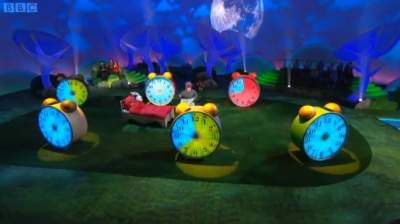 You wouldn't catch Colin Murray putting up with this.
You wouldn't catch Colin Murray putting up with this.Anyway, eventually, some points are awarded, and one of the teams is declared the winners, and are allowed to leave the set. The other side has to stick around, and play yet another game, this time a general knowledge quiz. With correct answers, they can lure The Hare through the orchard gate, and get him to eat carrots placed underneath a tree, so they can cut through a rope connected to a net they've cunningly concealed in the branches of the tree. Obviously, as soon as they cut through this rope, the inevitable will happen: the tree floats off into the sky, and their chance of capturing The Hare has been lost forever. The end.
The problems of Don't Scare the Hare are manifold. At heart, these are games that Double Dare would have rejected as a bit naff. If they were being played by children, some reviewers might give a little more leeway; this column wouldn't, because we believe that children's television should be held to the same standards as grown-up telly. The character of The Hare is so over-used that we start to catch glimpses behind the magic, and that's fatal. Jason Bradbury is so unremarkable that we could replace him with Identikit Host #332, and even Sue Perkins can't rescue the show on her own. It's almost as if the Beeb made this expensive prop, and couldn't find a vehicle for it.
It's always thought auspicious for the first programme from a new studio complex to be memorable, to be a high-quality production that will set the standard for everything that will follow. Here, it's not so much "set the standard" as "provide a baseline that everything else needs to clear, and probably will clear simply on the balance of probabilities". It's an Education and Learning opportunity, an example of an idea working on paper but not in execution.
We expect copies of Don't Scare the Hare will be sent to the BBC's Dire Emergency Broadcast Unit in a top sekrit location. They'll join the likes of Davina McCall's chat show and "What's the Problem With Anne Robinson?". If civilisation collapses, millions are dead and the handful survivors are huddled round television sets for warmth, the emergency broadcast will need programmes that almost no-one has ever seen before.
Top-quality programme for a post-apocalyptic world, that's Don't Scare the Hare.
Sing If You Can
RDF Television for ITV, 16 April to 21 May
This review is mostly based on the show of 7 May.
It's taken quite some years, but Leigh Francis has finally brought his Keith Lemon character to primetime television. Here's the surprise: it's not with the stupendously popular Celebrity Juice, but with a completely different show. On Sing If You Can, a series of celebrities are invited to perform popular songs, while being put off the beat.
As concepts for television programmes go, this isn't complex. Take some celebrities, have them do some karaoke, and throw things at them while they're doing it. It's about as simple as rocket science: throw stuff out in one direction, move in the exact opposite direction. It's almost as complex as ITV's choice of football matches: if Manchester United are involved, show the game. It's on a similar level to other Saturday night shows: do something silly, get some carrots for it.
The meal may be a little bland, but it can be spiced up by judicious use of sauces and flavourings. While Don't Scare the Hare is stuck with carrot soup and an unconvincing robot hare, Sing If You Can has a critical panel. On the show we caught, the panel was comprised of Trevor Nelson, a soul expert; Rachel Stevens, promoting the following week's International Rachel Stevens Week; and Louis Walsh, for reasons that will become clear. So that's one person who knows about good singing, one person who has done some pop singing, and one person who has managed Westlife. It's still more promising than what's on the other side.
In the swift-talking female co-host stakes, we think the BBC has a win. Stacey Solomon is a relative newcomer to television, having performed on The X Factor 2009, and won I'm a Celebrity in 2010. She's got promise, she can deliver one-liners and set up Lemon's punchlines, but she's nowhere near as polished as Sue Perkins. Give her some sustained practice, and we're sure Stacey Solomon will be a star.
And, oh yes, the challenges themselves. Toyah Willcox and Faye from Steps are asked to perform in the teeth of a howling gale. Sinitta is singing while taking her driving test and having stuff thrown at her, that brings to mind a classic Trevor and Simon skit from Live and Kicking. People from ITV soaps do stuff, and Jedward perform while having water thrown at them.
Yep, that'll be the same Jedward who were completely beaten by Stacey Solomon on The X Factor 2009, and who were only appearing on this programme to promote their appearance on the Eurovision Song Contest a week later. So heavily were they, and their manager Louis Walsh, doing the promotion that they didn't mention it the once. But it did enable us to answer one question: what happens when a quiff held up by lacquer meets a large amount of water? Don't scare their hair!
Between all of this is Keith Lemon's humour, lightweight jokes and insubstantial chitter-chatter. It's remarkably silly: for instance, he names the teams "Skeletor" and "He-Man", far less useless than the names on the other show. There's enough of an air of levity around to float through the occasional awkward moment, and the worst of those can always be edited out. At a couple of points during the programme, the fun stops while Stacey explains about this week's good cause. The celebs aren't just doing this for the good of their health, or their careers, but are attempting to raise money for a good cause. Viewers are invited to send an SMS and make a donation.
For various reasons, there has to be a winning team and a losing team. These are determined by the opinions of about 100 members of the studio audience, who vote for the team they preferred. During the voting, both team captains are suspended over a large tank of water, and the losing captain is plunged into the pool.
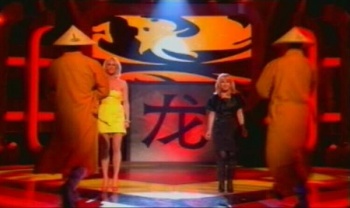 Faye Tozer (left) and Toyah Willcox face the ninja warriors.
Faye Tozer (left) and Toyah Willcox face the ninja warriors.
The winning team takes part in the endgame. They stand on a giant turntable, and are given money for as long as one of them can stay on it while singing – the cash ticks up at something like £100 per second. But they're on a turntable, and a turntable is only able to do one thing: turn. It starts off spinning quite slowly, and picks up speed as the round progresses. So long as someone is on there and singing (or, in the case of Jedward, doing whatever it is they do that isn't singing), the cash keeps on ticking.
And that's about it. Sing If You Can is a souffle of a programme, if you prick it it will deflate faster than a balloon. But, like Celebrity Juice, it's entertaining while it lasts, and never pretends to have any intellectual content. Don't Scare the Hare makes the fatal mistake of treating itself slightly seriously, and the weak format suffers for it.
This Week And Next
We were hoping to have a review of Channel 5's Impossible? in a future Week, but that's not possible, for the simple reason that Channel 5 took it off air before we could see it. Impossible went out at 10pm on Thursday, a Slot of Death. Not only is it competing against the juggernaut of Celebrity Juice, but there are repeats of The Eastenders on BBC3, the established cult show Psychoville on BBC2, House on The Satellite Channel, and Skatoony on Cartoon Network+1. Against such stiff and established competition, it's going to be difficult for a new show to make a mark. Almost as if they're lowering expectations for other shows in that slot later in the year.
In other ratings news, hats off to the Eurovision Song Contest, which was Britain's most popular television show in the week to 15 May. Ratings bureau BARB reports 9.7m people saw the final. The Apprentice launched with 8.8m viewers, and Britain's Got Talent fell away to a mere 8.6m. Sing If You Can was seen by 4.25m, and The Cube brushed past 4m. On the terrestrial minor channels, The Apprentice You're Fired had 3.2m viewers, Great British Menu 2.15, and Million Pound Drop 2.1m. Deal or No Deal had an unusual appearance on Friday – 1.85m for the main transmission, and 270,000 on Channel 4+1 – here, people had heard that someone had beaten the banker.
We welcome Channel 5 to this roundup, There's Something About Josie recorded 850,000 viewers. Beneath Celebrity Juice's 2 million on the digital-only channels were 1.03m for More Talent on ITV2, the Sunday narrative repeat had 860,000 viewers, almost double the previous week's showing. Come Dine on More4 was seen by 975,000, and Watch's New Scream If You Know The Answer had 110,000 viewers.
The Eurovision Song Contest results have been released, broken down into jury and televoting figures. Were the televoters in charge, Azerbaijan would have won by the eye-wateringly tight margin of two points from Sweden; the UK would have finished fifth, behind Greece and Ukraine. Ireland would have come tenth, just ahead of Italy, and Switzerland would have scored precisely two points. The UK voters and jury certainly voted for very different songs: the jury gave top marks to Switzerland and Italy, which the public ignored; Moldova and Iceland came second and third in the televote but got nothing from the jury.
This observation may generalise: were the juries ruling the roost, Italy would have taken the title by a margin of 69 points from the Azeris, Denmark and Slovenia just on their heels. Ireland would have claimed sixth place, and the UK sunk to fourth-from-bottom, albeit with a remarkable 57 points. Italy, Denmark, Slovenia, and Austria all gained more than 100 points on juries rather than popular voting; the people preferred Sweden, Russia, the UK, and Greece by similar margins.
Juries would have put San Marino, Malta, Belgium, and Slovakia through to the final at the expense of Russia, Georgia, Moldova, and Bosnia and Herzegovina. Televotes would have progressed Norway, Armenia, Turkey and Belarus rather than Serbia, Switzerland, Lithuania, and Austria.
Next week's Week features the penultimate Countdown final for Jeff Stelling, who has announced his retirement from the programme at the end of the year. That final goes out on Friday, C4 3.05. It's also Finals Week in Britain's Got Talent (ITV, 7.30 each night) and Great British Menu (BBC2, 6pm weeknights). Two new programmes begin on the holiday Monday: Gory Games (CBBC, 5.45, continues all week) seems to have a self-explanatory title. Alexander Armstrong's Big Ask (Dave, 9pm) has panelists asking questions of each other, hopefully with better fact-checking than on some other shows. A similar concept applies to It's Your Round (Radio 4, 6.30 Thursday) repeated from earlier in the year. And if your life is bereft of talent shows, ITV launches the second run of Popstar to Operastar (9pm Saturday).
To have Weaver's Week emailed to you on publication day, receive our exclusive TV roundup of the game shows in the week ahead, and chat to other ukgameshows.com readers, sign up to our Yahoo! Group.


